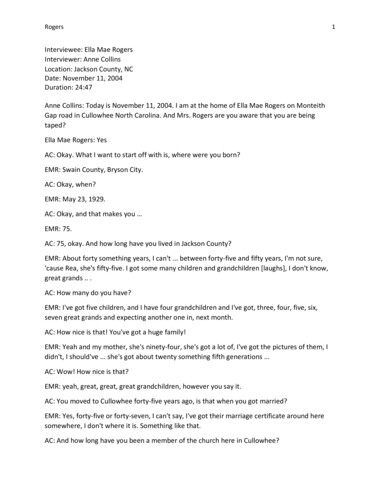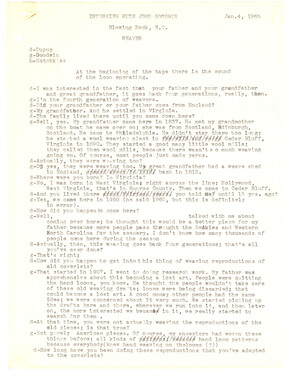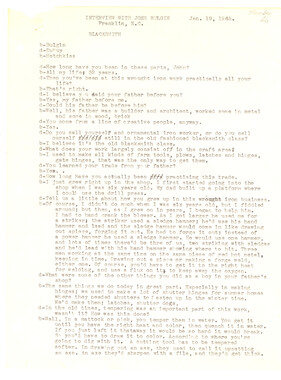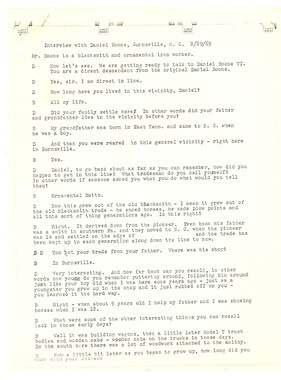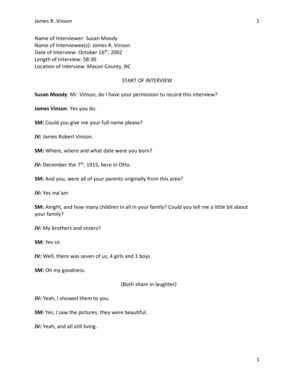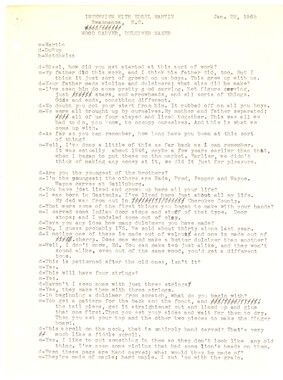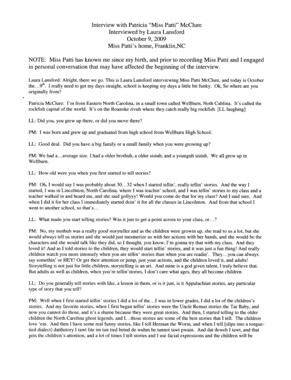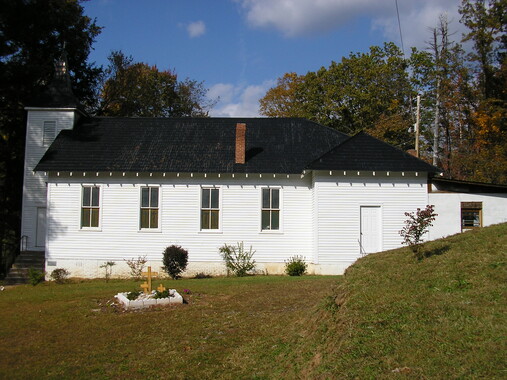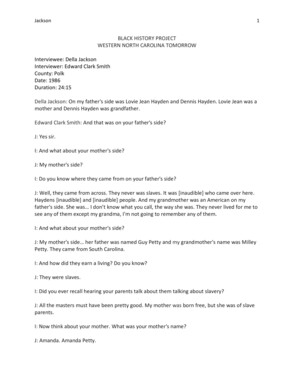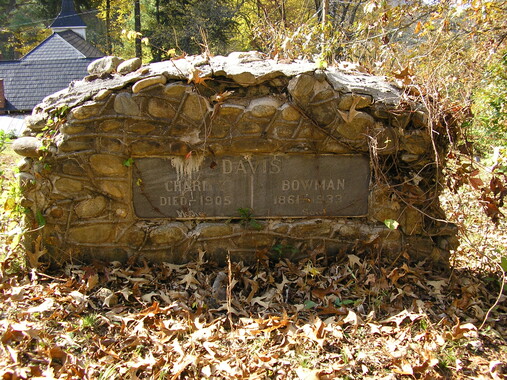Western Carolina University (20)
View all
- Canton Champion Fibre Company (2308)
- Cherokee Traditions (293)
- Civil War in Southern Appalachia (165)
- Craft Revival (1942)
- Great Smoky Mountains - A Park for America (2683)
- Highlights from Western Carolina University (430)
- Horace Kephart (941)
- Journeys Through Jackson (154)
- LGBTQIA+ Archive of Jackson County (15)
- Oral Histories of Western North Carolina (314)
- Picturing Appalachia (6679)
- Stories of Mountain Folk (413)
- Travel Western North Carolina (160)
- Western Carolina University Fine Art Museum Vitreograph Collection (129)
- Western Carolina University Herbarium (92)
- Western Carolina University: Making Memories (708)
- Western Carolina University Publications (2283)
- Western Carolina University Restricted Electronic Theses and Dissertations (146)
- Western North Carolina Regional Maps (71)
- World War II in Southern Appalachia (131)
University of North Carolina Asheville (6)
View all
- Allanstand Cottage Industries (62)
- Appalachian National Park Association (53)
- Bennett, Kelly, 1890-1974 (1295)
- Berry, Walter (76)
- Brasstown Carvers (40)
- Carver, George Washington, 1864?-1943 (26)
- Cathey, Joseph, 1803-1874 (1)
- Champion Fibre Company (233)
- Champion Paper and Fibre Company (297)
- Cherokee Indian Fair Association (16)
- Cherokee Language Program (22)
- Crowe, Amanda (40)
- Edmonston, Thomas Benton, 1842-1907 (7)
- Ensley, A. L. (Abraham Lincoln), 1865-1948 (275)
- Fromer, Irving Rhodes, 1913-1994 (70)
- George Butz (BFS 1907) (46)
- Goodrich, Frances Louisa (120)
- Grant, George Alexander, 1891-1964 (96)
- Heard, Marian Gladys (60)
- Kephart, Calvin, 1883-1969 (15)
- Kephart, Horace, 1862-1931 (313)
- Kephart, Laura, 1862-1954 (39)
- Laney, Gideon Thomas, 1889-1976 (439)
- Masa, George, 1881-1933 (61)
- McElhinney, William Julian, 1896-1953 (44)
- Niggli, Josephina, 1910-1983 (10)
- North Carolina Park Commission (105)
- Osborne, Kezia Stradley (9)
- Owens, Samuel Robert, 1918-1995 (11)
- Penland Weavers and Potters (36)
- Roberts, Vivienne (15)
- Roth, Albert, 1890-1974 (142)
- Schenck, Carl Alwin, 1868-1955 (1)
- Sherrill's Photography Studio (2565)
- Southern Highland Handicraft Guild (127)
- Southern Highlanders, Inc. (71)
- Stalcup, Jesse Bryson (46)
- Stearns, I. K. (213)
- Thompson, James Edward, 1880-1976 (226)
- United States. Indian Arts and Crafts Board (130)
- USFS (683)
- Vance, Zebulon Baird, 1830-1894 (1)
- Weaver, Zebulon, 1872-1948 (58)
- Western Carolina College (230)
- Western Carolina Teachers College (282)
- Western Carolina University (1794)
- Western Carolina University. Mountain Heritage Center (18)
- Whitman, Walt, 1819-1892 (10)
- Wilburn, Hiram Coleman, 1880-1967 (73)
- Williams, Isadora (3)
- Cain, Doreyl Ammons (0)
- Crittenden, Lorraine (0)
- Rhodes, Judy (0)
- Smith, Edward Clark (0)
- Appalachian Region, Southern (2393)
- Asheville (N.C.) (1886)
- Avery County (N.C.) (26)
- Blount County (Tenn.) (147)
- Buncombe County (N.C.) (1664)
- Cherokee County (N.C.) (283)
- Clay County (N.C.) (555)
- Graham County (N.C.) (233)
- Great Smoky Mountains National Park (N.C. and Tenn.) (478)
- Haywood County (N.C.) (3522)
- Henderson County (N.C.) (70)
- Jackson County (N.C.) (4692)
- Knox County (Tenn.) (21)
- Knoxville (Tenn.) (9)
- Lake Santeetlah (N.C.) (10)
- Macon County (N.C.) (420)
- Madison County (N.C.) (211)
- McDowell County (N.C.) (39)
- Mitchell County (N.C.) (132)
- Polk County (N.C.) (35)
- Qualla Boundary (981)
- Rutherford County (N.C.) (76)
- Swain County (N.C.) (2017)
- Transylvania County (N.C.) (247)
- Watauga County (N.C.) (12)
- Waynesville (N.C.) (68)
- Yancey County (N.C.) (72)
- Aerial Photographs (3)
- Aerial Views (60)
- Albums (books) (4)
- Articles (1)
- Artifacts (object Genre) (228)
- Biography (general Genre) (2)
- Cards (information Artifacts) (38)
- Clippings (information Artifacts) (191)
- Crafts (art Genres) (622)
- Depictions (visual Works) (21)
- Design Drawings (1)
- Drawings (visual Works) (184)
- Envelopes (73)
- Facsimiles (reproductions) (1)
- Fiction (general Genre) (4)
- Financial Records (12)
- Fliers (printed Matter) (67)
- Glass Plate Negatives (381)
- Guidebooks (2)
- Internegatives (10)
- Interviews (811)
- Land Surveys (102)
- Letters (correspondence) (1013)
- Manuscripts (documents) (619)
- Maps (documents) (159)
- Memorandums (25)
- Minutes (administrative Records) (59)
- Negatives (photographs) (5651)
- Newsletters (1285)
- Newspapers (2)
- Occupation Currency (1)
- Paintings (visual Works) (1)
- Pen And Ink Drawings (1)
- Periodicals (193)
- Personal Narratives (7)
- Photographs (12982)
- Plans (maps) (1)
- Poetry (5)
- Portraits (1655)
- Postcards (329)
- Programs (documents) (151)
- Publications (documents) (2237)
- Questionnaires (65)
- Scrapbooks (282)
- Sheet Music (1)
- Slides (photographs) (402)
- Sound Recordings (796)
- Specimens (92)
- Speeches (documents) (15)
- Tintypes (photographs) (8)
- Transcripts (322)
- Video Recordings (physical Artifacts) (23)
- Vitreographs (129)
- Text Messages (0)
- A.L. Ensley Collection (275)
- Appalachian Industrial School Records (7)
- Appalachian National Park Association Records (336)
- Axley-Meroney Collection (2)
- Bayard Wootten Photograph Collection (20)
- Bethel Rural Community Organization Collection (7)
- Blumer Collection (5)
- C.W. Slagle Collection (20)
- Canton Area Historical Museum (2110)
- Carlos C. Campbell Collection (198)
- Cataloochee History Project (65)
- Cherokee Studies Collection (4)
- Daisy Dame Photograph Album (5)
- Daniel Boone VI Collection (1)
- Doris Ulmann Photograph Collection (112)
- Elizabeth H. Lasley Collection (1)
- Elizabeth Woolworth Szold Fleharty Collection (4)
- Frank Fry Collection (95)
- George Masa Collection (173)
- Gideon Laney Collection (452)
- Hazel Scarborough Collection (2)
- Hiram C. Wilburn Papers (28)
- Historic Photographs Collection (236)
- Horace Kephart Collection (861)
- Humbard Collection (33)
- Hunter and Weaver Families Collection (1)
- I. D. Blumenthal Collection (4)
- Isadora Williams Collection (4)
- Jesse Bryson Stalcup Collection (47)
- Jim Thompson Collection (224)
- John B. Battle Collection (7)
- John C. Campbell Folk School Records (80)
- John Parris Collection (6)
- Judaculla Rock project (2)
- Kelly Bennett Collection (1314)
- Love Family Papers (11)
- Major Wiley Parris Civil War Letters (3)
- Map Collection (12)
- McFee-Misemer Civil War Letters (34)
- Mountain Heritage Center Collection (4)
- Norburn - Robertson - Thomson Families Collection (44)
- Pauline Hood Collection (7)
- Pre-Guild Collection (2)
- Qualla Arts and Crafts Mutual Collection (12)
- R.A. Romanes Collection (681)
- Rosser H. Taylor Collection (1)
- Samuel Robert Owens Collection (94)
- Sara Madison Collection (144)
- Sherrill Studio Photo Collection (2558)
- Smoky Mountains Hiking Club Collection (616)
- Stories of Mountain Folk - Radio Programs (374)
- The Reporter, Western Carolina University (510)
- Venoy and Elizabeth Reed Collection (16)
- WCU Gender and Sexuality Oral History Project (32)
- WCU Mountain Heritage Center Oral Histories (25)
- WCU Oral History Collection - Mountain People, Mountain Lives (71)
- WCU Students Newspapers Collection (1744)
- Western North Carolina Tomorrow Black Oral History Project (69)
- William Williams Stringfield Collection (2)
- Zebulon Weaver Collection (109)
- African Americans (388)
- Appalachian Trail (32)
- Artisans (521)
- Cherokee art (84)
- Cherokee artists -- North Carolina (10)
- Cherokee language (21)
- Cherokee pottery (101)
- Cherokee women (208)
- Church buildings (166)
- Civilian Conservation Corps (U.S.) (110)
- College student newspapers and periodicals (1830)
- Dams (94)
- Dance (1023)
- Education (222)
- Floods (60)
- Folk music (1015)
- Forced removal, 1813-1903 (2)
- Forest conservation (220)
- Forests and forestry (917)
- Gender nonconformity (4)
- Great Smoky Mountains National Park (N.C. and Tenn.) (154)
- Hunting (38)
- Landscape photography (10)
- Logging (103)
- Maps (84)
- Mines and mineral resources (8)
- North Carolina -- Maps (18)
- Paper industry (38)
- Postcards (255)
- Pottery (135)
- Railroad trains (69)
- Rural electrification -- North Carolina, Western (3)
- School integration -- Southern States (2)
- Segregation -- North Carolina, Western (5)
- Slavery (5)
- Sports (452)
- Storytelling (245)
- Waterfalls -- Great Smoky Mountains (N.C. and Tenn.) (66)
- Weaving -- Appalachian Region, Southern (280)
- Wood-carving -- Appalachian Region, Southern (328)
- World War, 1939-1945 (173)
Interview with Ella Mae Rogers
Item
Item’s are ‘child’ level descriptions to ‘parent’ objects, (e.g. one page of a whole book).
-
-
Rogers 1 Interviewee: Ella Mae Rogers Interviewer: Anne Collins Location: Jackson County, NC Date: November 11, 2004 Duration: 24:47 Anne Collins: Today is November 11, 2004. I am at the home of Ella Mae Rogers on Monteith Gap road in Cullowhee North Carolina. And Mrs. Rogers are you aware that you are being taped? Ella Mae Rogers: Yes AC: Okay. What I want to start off with is, where were you born? EMR: Swain County, Bryson City. AC: Okay, when? EMR: May 23, 1929. AC: Okay, and that makes you … EMR: 75. AC: 75, okay. And how long have you lived in Jackson County? EMR: About forty something years, I can't ... between forty-five and fifty years, I'm not sure, 'cause Ree, she's fifty-five. I got some many children and grandchildren [laughs], I don't know, great grands .. . AC: How many do you have? EMR: I've got five children, and I have four grandchildren and I've got, three, four, five, six, seven great grands and expecting another one in, next month. AC: How nice is that! You've got a huge family! EMR: Yeah and my mother, she's ninety-four, she's got a lot of, I've got the pictures of them, I didn't, I should've ... she's got about twenty something fifth generations ... AC: Wow! How nice is that? EMR: yeah, great, great, great grandchildren, however you say it. AC: You moved to Cullowhee forty-five years ago, is that when you got married? EMR: Yes, forty-five or forty-seven, I can't say, I've got their marriage certificate around here somewhere, I don't where it is. Something like that. AC: And how long have you been a member of the church here in Cullowhee? Rogers 2 EMR: I guess about forty years. AC: Shortly after you moved here, you became a member? EMR: Yeah. I belonged to the Morningstar Baptist Church in Bryson. AC: Before that? EMR: Yes. AC: Okay. What do you know about the history of the church here in Cullowhee? EMR: The only thing I know is just, the preachers you know and what we have accomplished since, you know I've been a member of the church, and what's been done to the church, since you know I was up here. AC: Okay. EMR: To Cullowhee church. I think we had some outside toilets. And we had to run coal, you know, for heat. And we didn't have a large area you know, for kitchen, the kitchen and dining rooms together. I don't know how many years ago, maybe about eight, a group of churches got together and they added kitchen to our church. And we didn't have carpet when I first came up here, but we have carpet now. And we have vinyl… AC: Vinyl floor? EMR: Vinyl floors for the dining room and the kitchen. When I first came here too, one commode in each bathroom, one for the men and one for the women. And now we got two commodes in the women and I believe it's just on there in the men's, I'm not too sure I don't go in there so [laughs]. AC: Well, I understand that! I wouldn't go in there either. [laughs] EMR: And we've got a nice set of cabinets that was built, Reverend Eddie Stillwell, he donated them to us. AC: I know who he is. EMR: He's sweet. AC: Nice man. Yes. EMR: A lot of stuff we got that's been donated ... is that alright to say? AC: Sure, sure. EMR: We have the hot water heater, the electric stove. [pause] Rogers 3 AC: That's okay. EMR: A lot of fans, you know, stuff that was given, or donated, either way you say it. And we have a deck that was built on to our church from some lady. To make it more room for like when you have big crowds in the summertime? AC: Oh, yeah. EMR: And eat, because the dining room is not all that large. And… AC: Do you have a lot of students from Western that come? EMR: Yes, a lot of students… AC: That's nice. EMR: They are associate members, and they help with a lot of stuff ... AC: I bet. EMR: We don't have that many members, and they helpful. AC: Are they? That's nice to have them. EMR: Yes it is. AC: Why don't you tell me some about the ministers that you remember from the church since you've been there. EMR: Oh, [laughs], only thing I can say about them, they were good speakers and out of the whole group, how many I got down here, (looks a list of names she has written down), seventeen, I guess that's right, only one had to be removed. AC: Really? Why was that? EMR: Something that wasn't nice that he did, I won't explain [laughs]. AC: That's fine. You don't have to, you don't have to. EMR: Uh hum, yes. Wasn't nice… AC: Out of seventeen that's pretty good isn't it? EMR: Yes it is, and a lot of them have died ... AC: Who was your most memorable, in a good way? EMR: Reverend Hodge [laughs] AC: Why was that? Rogers 4 EMR: Him and his wife, you know his wife was there to, I guess, I like all of them, we liked all of them but they was just our favorites. That was the only one that I can remember that we hated to see go. He stayed here about eight years and most of the time in the Methodist church. A pastor doesn't usually get to stay about four years. AC: And then they have to move on? EMR: Then they have to move, uh hum. AC: Oh, okay, and why do they do that? Do you know why they make them rotate to different churches? EMR: A lot of time if they doing good in one church, like our church, we have a pastor now, she'd doing real good and Reverend Hodge had done real good in our church, and when they see them doing good like that, they move them on to another church to help the church that's not doing well. You know, to help them do good. Different things, you know ... AC: Which is good for the other church… EMR: The other church. AC: Well it's good but it's not good, I guess. EMR: Um-hm. AC: Does your church, or has it in the past function like a social gathering place or has it in your memory for the people in your community, has it sort of a central place to gather or is it strictly church on Sunday and ... EMR: Whatcha mean like gathering ... AC: Like people get together, social may not be the right word but. A lot of churches are kind of the center of people's community and is a place where people meet and gather, was your, is your church like that? EMR: Oh, yes. A Mr… I know his name just as good, Oh, he live over here at Dillsboro, I mean Webster, I can't think of his name right off He's over the historical place. What's his name… Reverend, I mean, not a Reverend, I probably called him Reverend. I'll think of it after awhile, but anyways he brings people to our church; he hadn't done it in a while, he did about four or five years, you know for historical ... AC: How interesting ... EMR: Reasons, and then we go to other churches, he come to our church, maybe have it one year or maybe every year then they keep moving on to other churches. And they bring people in from Washington DC to ... You know, act out the play of, I got that paper in there somewhere. Some of the famous you know, Negro people. Rogers 5 AC: Right, right. EMR: Like I said, I can't remember, that name comes up so fast. AC: It'll come to you I'm sure. So, all of your kids went to church here? EMR: Yes. AC: And all of that? How many of your kids still live in the Cullowhee are? I know Cyritha lives in Franklin. EMR: Yeah, there three right now, but one's getting ready to move out. My, Stanley, he's moved out. Pat, she's here. And Dennis, he's here but he's getting married. AC: Well, that's a good thing! EMR: Um-hm. AC: Okay. Just a few questions about growing up here. Your grew up in Bryson City. How has it changed from the way it was when you were growing up? 'Cause I know it was really isolated at the time, and it's still kind of isolated. EMR: Yes it is. AC: How has it changed for you? EMR: Since I've been up here, had more people to be with and to deal with than we had in Bryson City because there wasn't that many people in Bryson City and. I mean I met a lot of people here white and black, and I've been to several churches up here, you know, because we don't have but one church here in Cullowhee. I hate to personate names like that but it's good, and of course at home we would go to other churches because we didn't have but one black church there either. AC: So you went to both white and black churches at home in Bryson City? EMR: Yes. AC: Okay. EMR: And the only transportation we had during that time was a big logging truck. [laugh] AC: Really? EMR: and we had to ride on that to go to these churches like Lands Creek, have you ever heard Lands Creek? AC: Uh-uh, I sure haven't. EMR: Different places, we used to go there and sing you know, and it was nice. And I didn't have a lot of, if I may say it like this, racial problems with the kids there when we was growing Rogers 6 up, because my grandmother, I had children you know, like that to play with. My grandmother would watch them and their mothers, their mother would watch me, 'cause I used to be bad to slip off and go down the hill and play marbles! AC: [laughs] EMR: So, mama would tell the lady, that if l come down there and not have my work done or anything, just get a switch and switch me back up the hill. AC: Really? EMR: So that's just how much my grandmother and the people that lived down below us took care of each other’s children. AC: That's a nice thing ... EMR: It was. AC: Well, and being so isolated too, in especially over in Swain County to me it's a little isolated still ... EMR: It is ... AC: It's nice to have people that'll look after your children, you know, back and forth. So you grew up and went to school in Bryson City? EMR: I went to Bryson City School, then I transferred to Sylva High School 'cause although there was a high school there we couldn't go. AC: Right. EMR: And from there I went to a boarding school, Allen High School in Asheville. And I went there one year, I went there to the eleventh grade and I just didn't like it. AC: Why didn't you like it, was it too far from home? EMR: Well in one way, and in one way you just had to be in you know, and which was good we couldn't go out unless out our teachers… It was just strictly for girls. Not bad girls, it was just a all-girls school like they have all-boys schools. AC: And what made you decide to go there, did your parents decide to send you? EMR: Yes, my uncle wanted me to go. AC: Oh, okay. Did he think you'd get a better education if you went? EMR: Yes. AC: Okay, how did you get from Bryson City to Asheville? Rogers 7 EMR: Well, I had to go in a car, but I stayed in a dorm. Just like at Western. AC: Sure, like at Western. So how often did you get to come home during that year? EMR: I can't remember cause that was back in I believe it was '45. AC: So you didn't like ... EMR: But they would come to see me, bring me stuff. AC: Was Asheville a lot different from Bryson City? EMR: Well I didn't get out to town like I did, it was you know, like I wanted to, but they was real strict on your studying than they was in Bryson. AC: Right, right, how do you mean they were strict? EMR: I mean you had to get your lesson, you had a study hour, you had study rooms and they had glee clubs and stuff like that, that we didn't have at home. We had Home Economics, and lot of other stuff that we didn't have. AC: Were you homesick? EMR: Yes I was, for a while [laughs]. AC: Were you? I could understand that. EMR: But they wouldn't hear that, they wouldn't come after me, they'd talk to me and you know, they'd come see me 'cause we didn't have telephone at that time. They'd come over to see me, they'd bring oranges, apples, that type of stuff, you know 'cause we couldn't go out to get any of that stuff. AC: That was nice when they carne to see you though, wasn't it? EMR: Uh-hmmm. AC: Did you say take me back with you I don't wanna stay? EMR: I might have, [laughs], I don't remember. AC: So you only stayed for a year, for the eleventh grade and then, decided and you carne back. You came back to Bryson City? EMR: To Sylva. AC: To Sylva? Okay. And what did you do then? EMR: Wait just a minute. Maybe I did come back to Bryson City. And was bused here, we was bused from Bryson City to Sylva, that's how it was. From Bryson City to Sylva, we had to get up Rogers 8 early in the morning, the bus, at that time it was called Jackson High and so after I got promoted to the eleventh grade, I got tired of school. AC: And said I'm done? EMR: I'm done, and I regret it! [laughs] AC: Well, I can understand that. So, when, you obviously got married… EMR: Yes. AC: Did you meet your husband in Sylva, or is he, was he local? EMR: From Cullowhee. AC: Okay, that's local. EMR: Yeah, and I was from Bryson City and he's local, yes. AC: Okay, and how long were you guys married? EMR: Thirty years. AC: That is a long time, EMR: Uh-hmm. AC: And did you work, did both of you work while you were married, or did he work and you stayed home and took care of the kids? EMR: I stayed home and took care of my kids until the youngest one got, till the youngest one started to school. After he started to school, then I had to be here when all five of them got out of school. Regardless of how they wanted me to stay, or, I just worked to a certain time and then be here when my kids got out of school 'cause he didn't want anyone to take care of the kids but me. AC: Sure, I can understand that. So where did you work at that time? EMR: I worked in private homes. AC: Did you, oh okay. Did you ever work on Campus? EMR: Yes, I worked at Western for about 22 years. AC: Doing what? EMR: Housecleaning. AC: Did your husband ever work for Western too? Rogers 9 EMR: Oh, he done most of, a lot of the brick on Western, he was a bricklayer, most of the bricks you see here, like the dorms, Walker, Scott, I think he worked on Helder too, and the cafeteria, a lot of places you see around the Cullowhee area, he [coughs], excuse me… AC: That's okay, EMR: Him and his daddy and his brother and also my son was a brick layer till he got hurt. AC: Oh, okay, yeah, Well, I don't know how much you know, but you know that the church was moved by Western, at one point. EMR: Yes well, he ... AC: And since you joined it so late, it probably didn't make that big of a difference to you or anybody ... EMR: [coughs] Not to me 'cause I didn't know… AC: Was there anybody in the congregation that you recall that ever had anything to say, [Pause] AC: Were there any members in the church that had anything to say about the church being moved and, or did anybody tell you about that? EMR: I heard about it, but I can't exactly ... AC: Well, not exactly name names, maybe, what have you, what have you heard? EMR: Some of them, you know sort of disgusted about, you know how we didn't have more, room and you know the church wouldn't be bigger than what it was. AC: Oh, Okay, Lets ... How has, how have things in Jackson County changed since you've been here, since you came back around 1945, and although Sylva's not as rural as Bryson City, but how has Jackson County changed? Is it grown or changed in any way that you can think of? EMR: I don't know, I'm not really down that way, unless I go to the store, to live here once in awhile, but all the new stores and stuff coming, is that what you're talkin' about? AC: Just however, whatever changes you've seen. EMR: Wal-Mart, it is a lot different, you know stores and stuff come in 'cause you know, you got way out of town like Asheville, or Waynesville to do shoppin', Christmas shopping, we figure we go out of town, get better prices, that's the only thing I can see different. AC: What about Cullowhee? EMR: Cullowhee has always been good to me... A nice place to live… AC: Yeah, it is, the university certainly has grown though, hasn't it? Rogers 10 EMR: It has, and still growing. AC: It just keeps getting bigger and bigger and bigger. EMR: It does. AC: I think that's about all I've got for you, is there anything else that you'd like to add about the church, or growing up in this area? Or anything at all? EMR: Nothing, 'cause I like it. I like the people, and I've had a lot of kids from United Methodist Church, they, you know, my grandson Brandon he used to help up to the church some. Had a big group over here once and they cooked and just had a good time. AC: How fun! EMR: I've had a lot of dealings with the people at United Methodist Church, so. It hasn't been any problems with me. AC: Well, good. How big is your congregation now at the church here in Cullowhee? Right offhand, do you know? EMR: All these other new members, I don't know, I really don't, but I could find out. AC: How many of the older members are still around? EMR: Well, Louise and Hazel's about the oldest ones, Of course, I'm climbing! [laughs]. AC: Well I know that Louise and Hazel's father was the Pastor at one time ... EMR: No, he was a deacon. AC: He was a Deacon. EMR: Sunday school teacher. AC: Was that while you were there? EMR: Yes. AC: As far as I understood, he had known quite a bit of history about the church. EMR: Oh, yeah. AC: And I’ve heard too, the pews in the church are handmade. ER Oh, yes! They are. I meant to tell you that too. I forgot it so ... they are handmade. They are very nice. AC: Cyritha said they were very uncomfortable. Said they were hard. EMR: They need padding on the seats. We'll get it one of these days, it just takes time. Rogers 11 AC: Well, is there anything else you'd like to add all? Well, I'd like to thank you for taking time out of your day to talk with me. EMR: Thank you for coming. AC: And I really appreciate it. EMR: I hope I was some help. AC: You were, you were a lot of help.
Object
Object’s are ‘parent’ level descriptions to ‘children’ items, (e.g. a book with pages).
-
Anne Collins interviews Ella Mae Rogers on November 11, 2004 for the Western North Carolina Oral History Project. Born May 23, 1929 in Swain County, Rogers moved to Cullowhee around 1950 after getting married to William Rogers (1924-1980). She talks about growing up in Bryson City, taking the bus from Bryson City to Sylva once she reached high school age, and going to Allen School in Asheville in 1945. She talks about the AME Mount Zion Church and working at Western Carolina University where she was a housekeeper and her husband was a brick layer.
-

